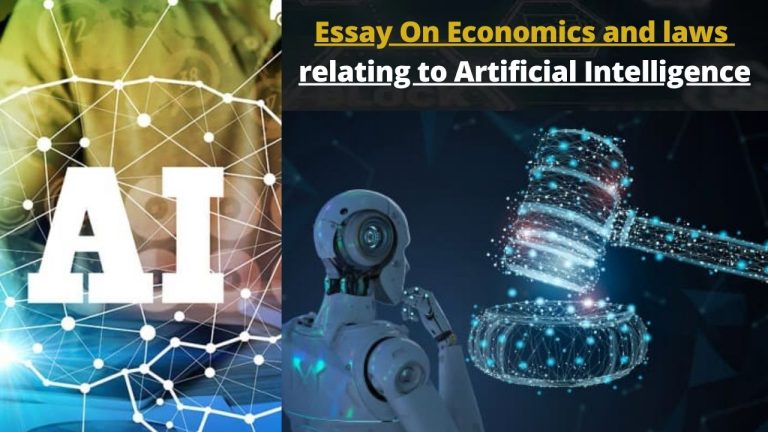"Advertisement"
Essay On Economics and laws relating to Artificial Intelligence
Hello My Dear Friend’s, In this post “Essay On Economics and laws relating to Artificial Intelligence“, We will be going to read about the Economics and laws relating to Artificial Intelligence as an Essay in details. So…
Let’s Start…
Essay On Economics and laws relating to Artificial Intelligence
Introduction
Artificial intelligence (AI) has emerged as a transformational force, revolutionizing a wide range of economic industries.
Its impact on industries, jobs, and society as a whole has necessitated a thorough assessment of the economics and legislation governing this rapidly expanding technology.
This paper investigates the economic ramifications of artificial intelligence, including productivity growth, job displacement, and market dynamics.
It also dives into the legal elements of AI development and deployment, examining intellectual property rights, liability, and ethical concerns that arise in the context of AI development and deployment.
Artificial Intelligence’s Economic Implications
AI has the ability to greatly increase productivity, resulting in economic development and creativity. AI systems can streamline operations, boost productivity, and offer cost savings for enterprises by automating tasks.
Furthermore, AI-powered data analytics can discover significant insights and inform decision-making, allowing for more accurate market forecasts and resource allocation.
However, broad AI use raises concerns about job displacement. While AI may remove certain mundane and repetitive duties, it may also open up new chances for workers to take on more skilled and creative responsibilities.
Nonetheless, re-skilling and up-skilling programs are becoming increasingly important in order to enable a smooth transition of the workforce into the digital age.
AI has an impact on market dynamics as well. The rise of AI-powered platforms has the potential to disrupt existing industries, altering market structures and posing new challenges to established firms.
These platforms use data and algorithms to optimally match supply and demand, resulting in improved competition and potentially lower market concentration.
Policymakers must keep a close eye on these developments in order to encourage fair competition and prevent anti-competitive behavior.
Legal Aspects of Artificial Intelligence
Because of the rapid evolution of AI technology, comprehensive legal frameworks are required to meet the ethical and legal concerns that accompany its development and deployment.
Intellectual property (IP) rights are a major source of worry. AI algorithms and models created by individuals or organizations are significant assets that must be well-safeguarded.
When AI systems develop new works or use existing intellectual material autonomously, determining ownership and dealing with infringement issues becomes more complicated.
Legal frameworks must evolve to offer clarity on intellectual property rights and to define standards for ownership and use of AI-generated outputs.
Another legal consideration in the context of AI is liability. As AI systems become more autonomous, problems about accountability for actions or decisions made by these systems arise.
Creating a clear framework for responsibility becomes critical, especially in industries like healthcare, transportation, and finance, where AI systems can have a substantial impact on people’s lives.
It is difficult to strike a balance between holding developers accountable and limiting creativity.
Furthermore, ethical considerations must govern AI system development and implementation. Fairness, openness, and privacy are all issues that must be addressed.
To eliminate biases, prevent discriminatory outcomes, and promote openness in decision-making processes, algorithms, and datasets must be scrutinized.
Furthermore, protections must be put in place to preserve privacy and to ensure that AI systems are utilized responsibly and ethically.
Conclusion
Artificial intelligence economics and legislation deserve serious consideration as this technology continues to transform our environment.
While AI has enormous economic growth potential, its impact on employment and market dynamics needs preemptive efforts to overcome possible difficulties.
Legal frameworks must evolve to address intellectual property, liability, and ethical concerns while maintaining a balance of innovation and accountability.
We can exploit the benefits of AI while reducing its threats by traversing the digital frontier with a complete awareness of its economic and legal dimensions, assuring a successful and ethical future for everybody.
If you have any questions related to “Essay On Economics and laws relating to Artificial Intelligence“, So, please comment below.
Must Read:
Essay On My Vision for India’s G20 Presidency
How to Take a Study Break In 7 Steps
